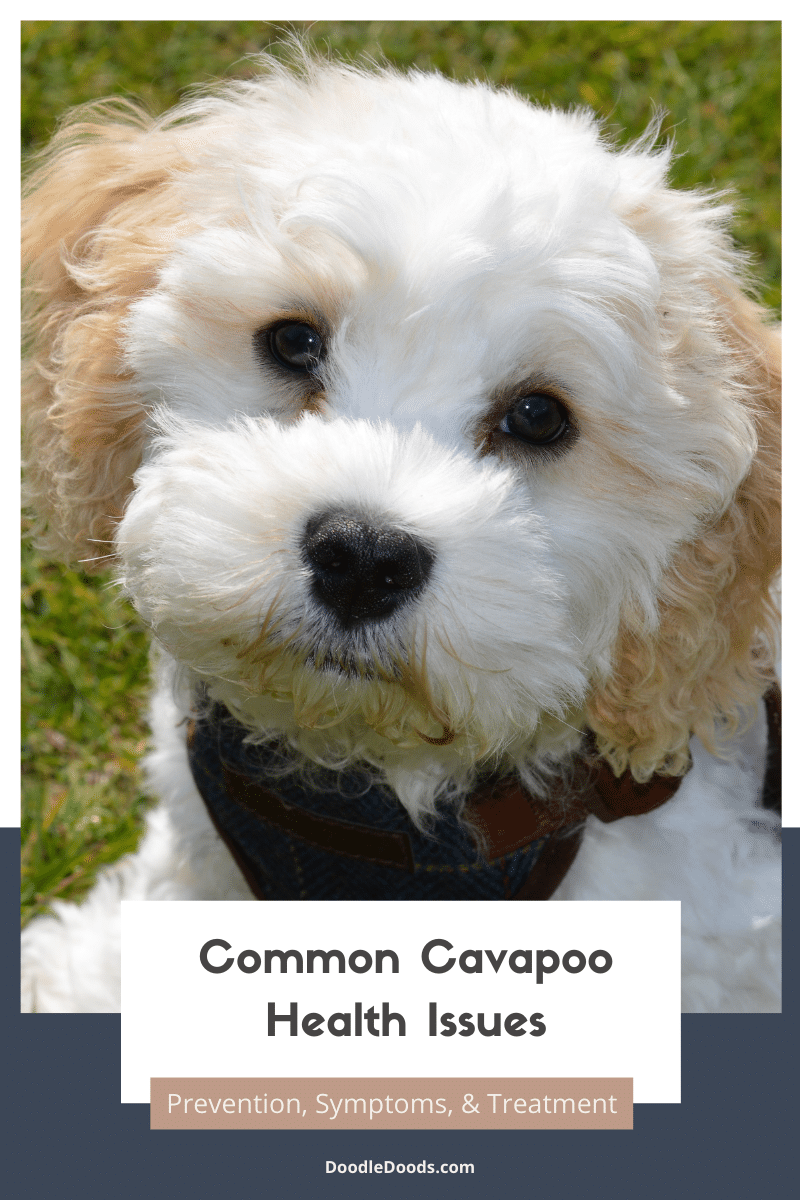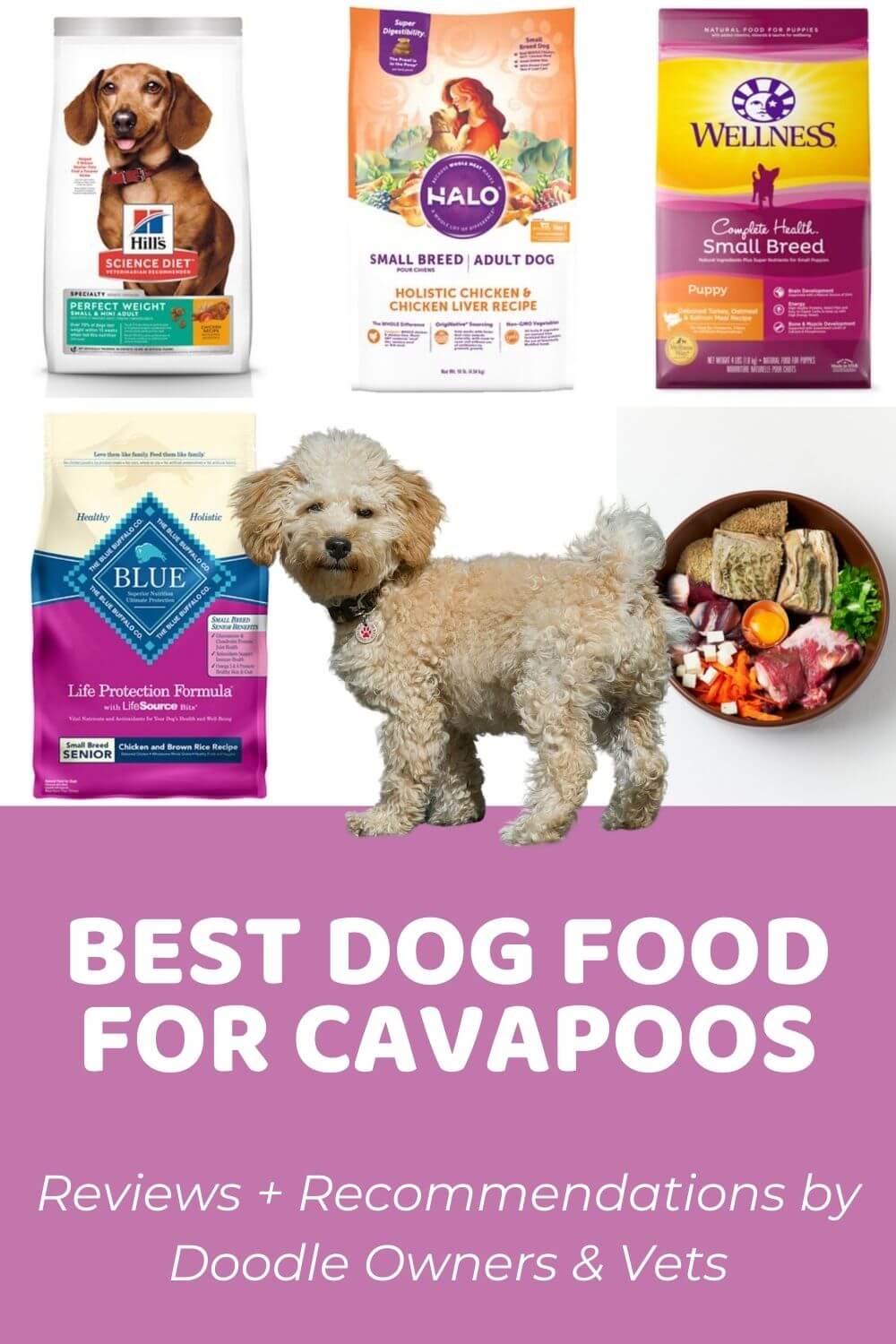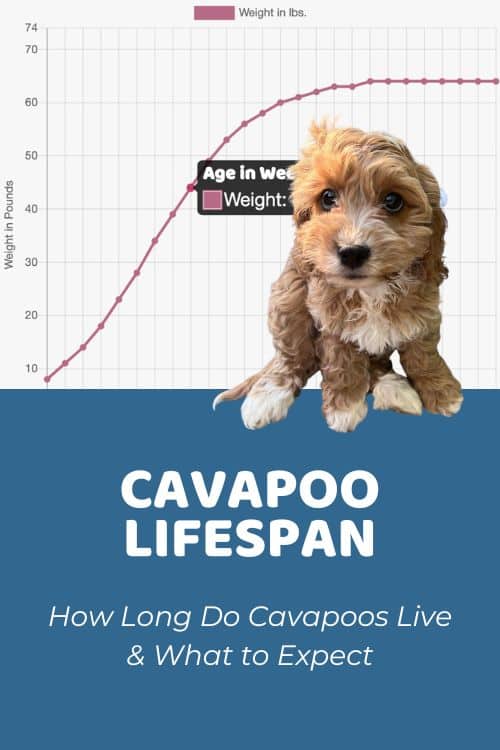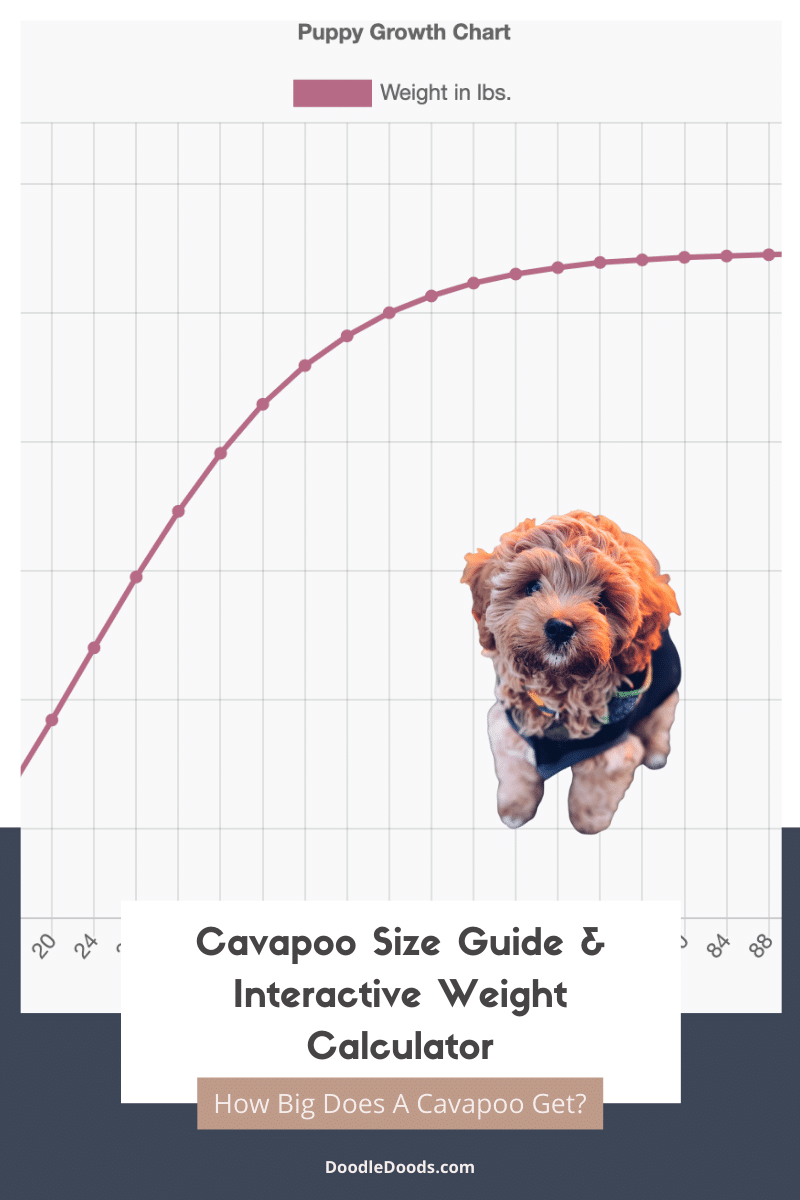If you’ve got a Cavapoo, chances are that at one point or another, your best pal will experience some health concerns. For this reason, we decided to prepare for you a full in-depth guide on the most common Cavapoo health issues, as well as their symptoms, so that you can be fully-prepared for any and all uncertainties. Keep on reading to learn more!
Table of Contents
- What Are Cavapoos?
- Cavapoo Health Issues: Are Cavapoos Healthy?
- 7 Common Cavapoo Health Issues You Should Know About
- How To Prevent Cavapoo Health Issues?
- Cavapoo Health Issues: Frequently Asked Questions
- Cavapoo Health Issues: Final Thoughts
What Are Cavapoos?
Cavapoos are a hybrid cross between the Cavalier King Charles Spaniel and Poodle. This is one truly amazing crossbreed that inherits the absolute best traits from its parents. Cavapoos are loving, outgoing, highly intelligent, and ridiculously adorable little Doods.
Just like their Cavalier parents, Cavapoos are loving and gentle pups that make friends everywhere they go. They’re also quite playful, a trait that’s surely inherited from the Poodle. Of course, we cannot forget that from their Poodle parents, these little Doods inherit the fluffiest, most beautiful coats, often considered even hypoallergenic. Although there’s no such thing as a 100% hypoallergenic dog, these lil’ guys do come pretty close!
As the Cavalier King Charles Spaniel is a rather small dog, they are almost always crossed with either Miniature or Toy Poodles, the latter resulting in a much smaller sized Cavapoo. For this reason, Cavapoos make excellent companions for both apartment dwellers and people with huge, spacious homes. These pups can fit everywhere!
Cavapoo Health Issues: Are Cavapoos Healthy?
Indeed, one of the many great things about Cavapoos is that they’re generally healthy dogs with quite a long life expectancy. Cavapoos have a lifespan of about 13 to 15 years, give or take. Of course, this is all very much affected by how they’re bred, and how you take care of your pup. All of which we’ll cover a bit later on in this guide.
One key thing to remember with hybrid breeds like the Cavapoo (and other Poodle mixes) is that they’re often thought to be healthier than their purebred parents. This is called hybrid vigor, which indicates that because crossbreeds have a more diverse genetic makeup, they inherit superior qualities from their purebred parents. Therefore, they may be less likely to inherit certain breed-specific health conditions that are common in either Poodles or Cavaliers.
Nonetheless, the key here is responsible breeding, which includes extensive health and DNA testing of the breeding dogs. Only then will breeders be able to mate together the healthiest parents, minimizing the risk of the puppies inheriting certain genetic illnesses.
What’s more, this doesn’t mean that Cavapoos never suffer from any health conditions, even if they come from the healthiest, strongest bloodlines. They’re still at risk of certain genetic conditions that are prevalent in both Poodles and Cavaliers, and that’s why it’s crucial that you know exactly what you’re up against.
7 Common Cavapoo Health Issues You Should Know About
So, as we discussed, Cavapoos are at risk of some health conditions that are common in Poodles and Cavaliers. In fact, many of them even overlap in both purebred parents. Let’s now take a closer look at some of the most common Cavapoo health issues, as well as the symptoms you should watch out for. Knowing exactly what to expect will help you get your pup the right treatment even at the earliest stages, minimizing the risk of dangerous, even fatal consequences.
Mitral Valve Disease (MVD)
Mitral valve disease, or MVD, is a common heart condition that Cavapoos are at risk of. This condition is mostly inherited from the Cavalier King Charles Spaniel – MVD is one of the most common causes of death in Cavaliers.
The heart’s mitral valve is responsible for healthy blood flow of the heart. However, if the mitral valve starts to deteriorate, it will cause the blood to flow back into the heart. It is caused by the weakening of the mitral valve that separates the left atrium and left ventricle in the heart. The weakened area of the valve allows blood to leak from the left ventricle back into the left atrium, reducing blood flow and leading to heart failure and other health problems.
Although it’s not exactly known what exactly causes mitral valve disease, it’s thought to be mostly a genetic condition that can be passed onto the offspring from the parents. However, certain other heart diseases can also lead to MVD. That’s why genetic testing of the breeding dogs is crucial, as it helps reduce the risk of your pup inheriting this heart disease.
Mitral valve disease has a progressive nature, so it’s vital that you know how to spot the signs early on. If caught early, MVD can be managed with medications and lifestyle changes, but treatment options are limited and not all dogs respond well to them, especially in the later stages of the disease.
Symptoms of mitral valve disease in Cavapoos include:
- Heart murmur
- Shortness of breath and panting
- Coughing
- Weight loss
- Intolerance to exercise
Progressive Retinal Atrophy (PRA)
Progressive retinal atrophy, or PRA, is an eye disease that’s common in purebred Poodles, but also Cavaliers. PRA affects a Cavapoo’s sight and it has a progressive nature. Unfortunately, there’s no cure for PRA and it often leads to blindness as it progresses. On the other hand, this condition isn’t generally painful for our four-legged pals, but it does make their life a bit more complicated.
Progressive retinal atrophy is also a genetic condition that can be prevented to some extent with rigorous genetic testing of the breeding dogs. However, you can also implement certain lifestyle and dietary changes to keep your pup’s eyes healthy and in great condition, such as feeding a high quality diet and supplementing with certain nutrients that support eye health in dogs. You can also support your Dood by being mindful of their surroundings, helping them up and down the stairs, not rearranging the furniture, and guiding them whenever it’s getting darker.
The common signs of PRA in Cavapoos include:
- Loss of vision at night and in dark, shaded areas
- Anxiety and fearfulness whilst in dark or shaded areas due to the loss of sight
- Clumsiness, especially if they’re not familiar with their surroundings
- Dilated pupils
- Cloudy eyes
- Decreased eye pigment
- Cataracts
- Loss of vision during the day
Luxating Patella
Patellar luxation is a joint disease that’s common in small-sized breeds like the Cavapoo. Both Cavaliers and Poodles are prone to this condition, so their Doodle offspring are also at risk of this disease. In addition to the genetic predisposition, luxating patella can also be caused by a trauma or injury.
Patellar luxation is a condition in which the kneecap moves out of place from its normal position against the femur. It can cause pain and lameness, and it can lead to arthritis in the affected joint over time if left untreated. There are various degrees of luxating patella, so the treatment plan depends on how severe it is. In latter stages, the treatment plan for luxating patella usually involves surgery to correct the bone shape, repair damaged ligaments, or realign the kneecap.
Signs of luxating patella in Cavapoos include:
- Pain and reluctance to exercise
- Difficulty getting up or lying down
- Lameness, limping, skipping, and hopping
- Hunched lower back
Hip & Elbow Dysplasia
There’s another Cavapoo health issue that’s affecting the joints – hip and elbow dysplasia. This is another condition that reputable breeders test their parent dogs for, as it’s often inherited. Essentially, hip and elbow dysplasia cause the ball and socket of the joint to become dislocated. This can cause a dog severe pain, difficulty moving, and other issues. Due to a dog’s inability to properly use its legs, the muscle mass will also start to deteriorate. This in turn will then cause the hip or elbow dysplasia to progress even further.
Although hip and elbow dysplasia can be inherited from the parents, they can also be caused by excessive stress on the joints and trauma, such as obesity or injuries. For this reason, keeping your dog at a healthy weight is vital, as all of that excessive weight can cause damage to the joints.
Again, hip and elbow dysplasia have different stages – in the early stages, the condition can be managed with lifestyle changes, a healthy diet, certain supplements like chondroitin and glucosamine, and weight management. However, if the disease has progressed, surgical intervention will likely be necessary.
Hip and elbow dysplasia symptoms are often very similar to patellar luxation:
- Difficulty getting up and lying down due to pain
- Limping, bunny hopping, and stiffness
- Reluctance to exercise
- Loss of muscle mass
Epilepsy
Epilepsy is a neurological disorder that causes seizures in dogs. This is another Cavapoo health problem that’s common in both Poodles and Cavalier King Charles Spaniels. There may be many possible causes of this condition, one of them being genetic predisposition. Seizures can also happen due to a brain injury or another neurological disease.
There are various types of epilepsy as well as various degrees to this condition. Some dogs have frequent seizures, whereas others experience them rarely. In extreme cases, some dogs experience clusters of seizures or severe seizures, where the seizures are violent and last for hours at a time. Additionally, some seizures only affect a part of the body, whereas others affect the whole body.
Seizures can be prompted by becoming overly excited, being tired and not getting enough sleep, and excessive stress and anxiety. Of course, if your dog has been diagnosed with epilepsy and has been prescribed medications by your vet, it’s vital that you administer them regularly. Otherwise, it’s likely for the seizures to occur again.
In addition to the obvious symptom of epilepsy – seizures – there are other signs to watch out for:
- Anxiety and fearfulness before a seizure
- Clumsiness
- Excessive vocalizations
- Excessive drooling
- Stiffening of the neck and legs
- Falling over and stumbling
- Facial twitching
- Shaking and trembling
Hernias
You’ve probably heard about hernias in humans – a rather common, but extremely painful issue. But did you know that dogs can also suffer from this condition? Hernias are quite common in Cavalier King Charles Spaniels. Consequently, Cavapoos are at risk of this health problem as well.
But let’s talk a bit about the specifics. A dog has a hernia when organs or fat protrude through a muscle in the abdomen. Hernias can develop either due to congenital defects or as a result of an injury or a trauma. By the way, even female Cavapoos can suffer from this condition.
Depending on the severity of the hernia, it could cause great suffering for your pup, especially if left untreated. Treatment usually involves surgery to repair the hernia and may involve closing the opening in the abdominal wall or realigning muscles. If you suspect a hernia, it’s vital to get your pup checked by a veterinarian as soon as possible, as untreated hernias could lead to infections and other serious health issues.
Common signs of hernias in Cavapoos include:
- Loss of appetite
- Vomiting after eating or drinking water
- Lethargy
- Cramping and abdominal pain
- Swelling
- Excessive vocalizations due to pain
- Fever
Syringomyelia
Another condition inherited from the Cavalier King Charles Spaniel is a condition called syringomyelia. Syringomyelia is a condition where fluid builds up in the cavities in the spinal cord. Consequently, this can lead to persistent pain and nerve damage in affected areas. One of the most common symptoms of Syringomyelia is phantom scratching and licking – it may seem like your dog can’t stop scratching that one certain spot on the neck. Of course, this could indicate that they have an ear infection. But, it could also hint at a potential onset of syringomyelia.
The cause of this condition is often unknown but can be caused by trauma or an underlying neurological disorder, such as Chiari-like malformation. Treatment usually involves medications to reduce inflammation and pain, and physical therapy to help with mobility. In some cases, surgery may also be recommended. However, some sources say that the surgical intervention has a high failure rate.
In addition to that, you can also make your dog’s life easier by having them eat and drink from elevated bowls – this will relieve some of the strain that’s usually put on the neck and back. Some owners also opt against collars, as these can also put excessive strain on the neck and back, causing pain and discomfort.
Symptoms of Syringomyelia in Cavapoos include:
- Phantom scratching and licking.
- Anticipation of pain and changed behavior in certain situations.
- Reluctance to jump or run due to pain.
- Pain when being handled or when there’s stress on the back/neck. For instance, when pooping.
- Crying and whining due to pain.
- Excessive licking of the paws and feet.
- Excessive rubbing of the face.
Other Common Cavapoo Health Issues
There are also other, less severe Cavapoo health issues that you should take into account. Firstly, like other Poodle mixes, Cavapoos may have sensitive stomachs and experience food allergies and food intolerances. Similarly, they may also experience other allergies and sensitivities. For instance, it’s not uncommon for certain dog shampoo or conditioner ingredients to trigger allergies and other skin reactions.
Secondly, Cavapoos are also prone to ear infections – all thanks to their floppy ears. As their ears have restricted airflow, the bacteria can easily start to spread whenever moisture gets trapped inside. To prevent ear infections in your Cavapoo, we recommend you regularly clean their ears with a dog ear cleaner, about once a week or so. In addition to that, you should always dry the ears after every swim or bath. Ear hair trimming can also be super helpful!
Lastly, you should also be mindful of your dog’s dental health, as improper oral hygiene could lead to more serious issues. Regular teeth brushing, dental treats, and routine vet visits to remove any plaque and tartar buildup can all help prevent further issues down the road.
How To Prevent Cavapoo Health Issues?
Although learning about all the possible Cavapoo health issues is by no means easy, it’s important that you know exactly what to expect and what symptoms to look out for. Only then will you be able to get your four-legged pal the right treatment in the early stages of the condition. Fortunately, there are also a few things you can do to prevent those illnesses altogether, and prevent them from progressing into more severe stages. Not to mention, getting the right treatment from your vet will provide your best pal a much better prognosis.
So, without further ado, let’s now take a look at some of the most important things you should do as a responsible pet owner to support your Cavapoo’s health, wellness, and longevity.
Only Adopt From A Reputable Breeder
The single most effective thing you can do to ensure that you’re getting a healthy puppy is adopting from a reputable breeder. These breeders follow ethical breeding guidelines and have extensive experience and knowledge on all things related to responsible breeding, including diet, training, and socialization. They also extensively test all of their parent dogs before breeding any litters, as this greatly reduces the risk of the puppies inheriting certain genetic conditions from the parents.
If you’re looking for reputable Cavapoo breeders in the US, be sure to check out our Doodle Doods Cavapoo Breeders Directory.
Get Your Cavapoo Regularly Checked By A Vet
As we’ve already mentioned more than a few times, getting your pup checked by a veterinarian is one of the best ways to prevent and treat any possible illnesses. The sooner you’ll notice changes in your dog’s behavior and wellbeing, and the sooner you take action, the better the prognosis will be.
In addition to that, we also recommend you take your Dood to the vet for yearly check ups throughout adulthood, as some illnesses simply aren’t noticeable. During puppyhood and senior years, more frequent vet visits are recommended.
A Healthy & Balanced Diet Is Vital
Another key thing to take into account is your Cavapoo’s diet. A healthy, nutritionally balanced diet can prevent many health conditions and support your pup’s health until the very end. Equally important is the amount of food you feed your dog – malnourishment and obesity can both lead to severe health conditions. For instance, obesity is one of the biggest risk factors for joint problems.
You should also be mindful of the quality of the food. We recommend you opt for a high-quality, vet recommended formula that contains real ingredients, such as these options here. You should also avoid any unnecessary artificial filler ingredients, flavors, or preservatives, as all of these can trigger allergic reactions.
Exercise & Mental Enrichment
On top of all that, you should never neglect your Cavapoo’s exercise regimen and their mental stimulation. Exercise helps manage weight, keep their joints, bones and muscles healthy, and also prevent a wide range of other health conditions.
Mental stimulation acts in a similar way, but it’s more targeted for the mind. As Cavapoos are such intelligent little Doods, they also need to keep their brains busy with fun puzzle games, interactive toys, and regular training (if you need any help in that area, we recommend Baxter & Bella’s Online Puppy School). In fact, both mental and physical stimulation help prevent boredom, which is a well-known cause for destructive behaviors and excessive stress.
Don’t Forget Oral Hygiene!
Lastly, you should also set aside time for regular teeth brushing to prevent plaque and tartar buildup. If left unattended, these issues can soon become much bigger conditions that could greatly harm your pet’s overall health. That’s why it’s also vital that you have your Cavapoo checked by a vet at least once a year – if there are any changes in their oral health, they’ll be able to find the best possible solution for your pooch. This sometimes includes professional teeth cleaning. Moreover, as a precautionary measure, you can also get some tasty dental treats for your Dood to chew on.
Cavapoo Health Issues: Frequently Asked Questions
Not necessarily, no. Of course, Cavapoos are at risk of certain health conditions that are prevalent in purebred Cavaliers and Poodles. Some of the most common Cavapoo health issues include hip and elbow dysplasia, patellar luxation, mitral valve disease, progressive retinal atrophy, epilepsy, syringomyelia, and hernias. They’re also prone to ear infections, allergies and sensitivities, and dental health problems.
Indeed, it’s thought that Cavapoos are healthier than Cavalier King Charles Spaniels, as they also have the Poodle in their genetic makeup. Hybrid breeds like Poodle mixes are thought to benefit from hybrid vigor – this indicates that crossbreeds inherit superior qualities from their purebred parents thanks to their more diverse genetic makeup.
The average life expectancy of a Cavapoo is around 10 to 15 years. However, some very lucky pups can even live up to 20 years old!
Yes, Cavapoos can be excellent pets even for first time dog owners! They’re super friendly, affectionate, and outgoing. Also, they’re usually very easy to train thanks to their high levels of intelligence and eagerness to please their human parents.
All dog breeds have their pros and cons and the Cavapoo is no different. The obvious pros of Cavapoos include their friendly and sweet nature, low-shedding and allergy-friendly coats, high levels of intelligence, small size, and great health and expected lifespan. On the other hand, they are rather high-maintenance when it comes to grooming. They’re also prone to separation anxiety, which means that they shouldn’t be left alone for the majority of the day.
Cavapoo Health Issues: Final Thoughts
We hope this guide about the most common Cavapoo health issues has been informative and helpful. It’s important to remember that all dogs are at risk of certain health conditions, but taking care of your pooch’s physical and mental health can have a positive effect on their longevity and wellbeing. That’s why it’s so crucial to support your pup with regular vet checkups, proper nutrition, and plenty of exercise. And of course, to take into account all the possible risks, so that you can be well prepared throughout all of your Cavapoo’s life stages.
Learn How to Care for Your Doodle Puppy!

Perfect for first-time Doodle parents, get ALL your questions answered, including questions new Doodle parents don’t even think to ask.
Plus, get $700 worth of Bonus Materials for FREE, including:- Doodle Parenthood Community and Support Group ($190 value)
- Doodle Puppy Growth Tracker ($20 value)
- EMERGENCY Cheatsheet: When To Call The Vet Immediately ($50 value)
- HELP! Button ($145 value)
- And SO MUCH MORE!





